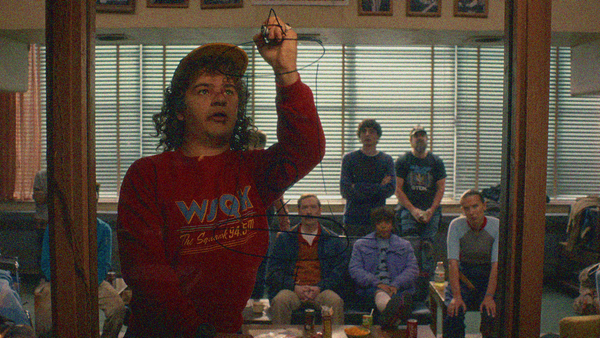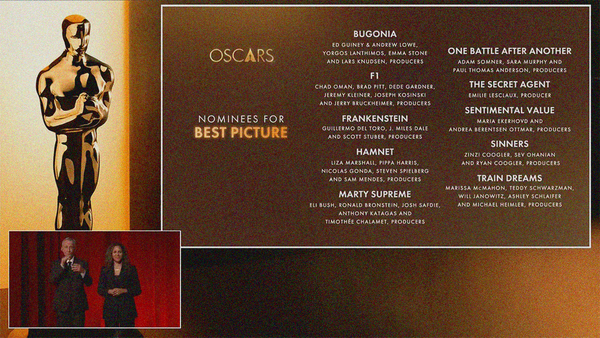TIFF 2025: Day Seven
Screeners keep coming

My The Film Stage assignments are now all filed, so the rest of my TIFF is sorting through the screeners I couldn't get to pre-fest and snagging a few more being offered to me now that I've returned.
I'd love to watch two each day while I quarantine away from my partner in the attic (still no TIFF-induced COVID yet), but that might prove tricky with my return to work. I'll do my best, though, because there are still so many intriguing titles available.
Thirty-six reviews done ... here's to maybe ten or twelve more? It's possible if I keep dispatches going into next Monday and Tuesday post-fest. Could I get to fifty thanks to so many publicists coming through this year? It's not impossible.
Today's schedule:
• Nomad Shadow, d. Eimi Imanishi | Centrepiece | USA, Spain, France | Arabic, Spanish
• Levers, d. Rhayne Vermette | Wavelengths | Canada | English, French

Amoeba
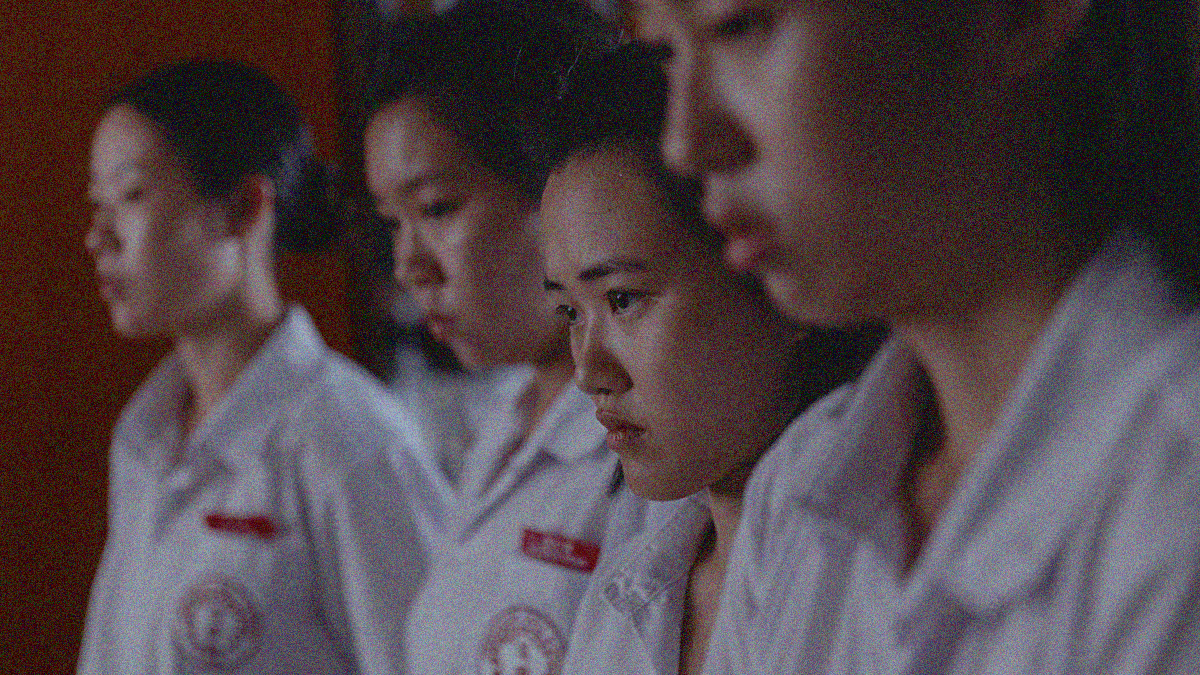
Siyou Tan's Amoeba is a ghost story ... just not the one you think. Because despite opening on the lo-fi night-vision footage of Choo (Ranice Tay) and Nessa (Nicole Lee Wen) attempting to capture the specter that's been haunting the former's bedroom, this entity is less plot point than catalyst for the friendship formed. Choo is the new kid in school and it's her ghost that fascinates Nessa into introducing herself and her best friends Sofia (Lim Shi-An) and Gina (Genevieve Tan) to her. And it's together that they dare to exist for themselves rather than their nation's demands.
The real ghost is therefore Singapore itself and the reality that it's been torn down and rebuilt so many times by its own government that one would have a difficult time pinning down its exact history. That's why the girls' private school's main motivation seems to be creating "good citizens" rather than good people. Much like how American schools base their curriculum on what's necessary to prepare the next generation for a capitalist labor market, teachers like Adeline Lim (Jo Tan) are tasked with ensuring their wards become easily governable wives and mothers who willingly give themselves to the greater patriarchal good of the country's prosperity.
All four of these characters understand the game being played both because they're cognizant enough to see it and free-spirited enough to instinctively want to fight against it. They're kindred spirits who needed an outsider like Choo to finally cement the confidence necessary to rebel. It was one thing to merge the forces of money (Sofia), athletics (Nessa), and class clown antics (Gina) into an unlikely trio, but it's another to find a true revolutionary unfazed by the consequences of standing her ground to inspire and lead them simply by virtue of not being too afraid to say what they rest are thinking.
Choo becomes the group's idea man. It takes Sofia's resources, Nessa's legitimacy, and Gina's fun to get them off the ground, but Choo is the one who gauges the collective mood and pushes them forward. She's the one who suggests they start a gang—not to wreak havoc (although the romanticization of doing so isn't lost on them), but to lend their tribe permanence regardless of there being no guarantee they'll see each other again come junior college next year. The time is now to blow off steam, cuss out their school's oppression and hypocrisy, and flirt with the idea of actually upending the status quo.
Enter Sofia's affable driver Mr. Phoon (Jack Kao) and his desire to play along with their aspirations by teaching them what it really takes to be a gang. Does he actually know? Does it matter? Whether Phoon is a former gangster or not, he recognizes that they've chosen to live beyond the constraints of indoctrination. He understands they deserve the choice to be whomever they wish. So, he talks about brotherhood and loyalty. He shows them a ritual to bond themselves for eternity. He provides them the room to be kids when every other adult in their lives reprimands them for letting one strand of hair get out of line.
Tan talks about how Amoeba was born from her own experiences growing up in Singapore and the closeted misfits she gravitated towards in detention as "brothers" rather than "sisters" if only to flip off the establishment. So, it's not surprising this world feels so authentic in its depiction of how insane this form of repression becomes when there's no wiggle room or compromise. I love the scene where the girls' camcorder is confiscated and the school weighs whether to call the police after seeing them singing a "gang" song. The earnestness of this terror astounds. It's like they've never had fun in their lives.
But this isn't just a generational contrast. It's also a byproduct of Singapore reimagining its past as a myth. It's proof of how effective the education system is at stripping away individuality and upholding the conservative traditions of a ruling class desperate to maintain control. Tan presents the dynamic for the girls (and us) to laugh at this absurd reaction, but it's also to contextualize what comes next. Because this is their final year at the school. Decisions must be made about what's next. And while it's fun to rebel and speak your truth in private, the fear instilled by their culture's expectations to do so publicly is debilitating.
Don't therefore dismiss the film's first two-thirds as a cutely familiar coming-of-age lark. It might play like that to an American like me, but the gravity of the situation is much direr. Cue a wonderful scene of Choo meeting Phoon's old friends to add depth to the "gang" aspect and the reality that youthful promises aren't easily kept. Cue final exams and the point-of-no-return as far as picking truth or fantasy. That last part really helps Tan's message stand apart because "truth" and "fantasy" are subjective. Choo's truth is to be uncompromising. To the others, however, that might be the fantasy.
It's why the final sequence packs such an emotional punch despite it being the most static piece of the whole. Tan shows us all four girls sitting separately opposite the camera as a stand-in for their exam proctor. The question posed is the same and their collective plan for how to respond has already been agreed upon, betrayed, and tenuously agreed upon again. But none of that matters anymore. This isn't a union seeking solidarity like Phoon's story or a sports team seeking a championship. It's time to look inside and choose for themselves. Succumb to the propaganda or fight.
7/10
The Cost of Heaven
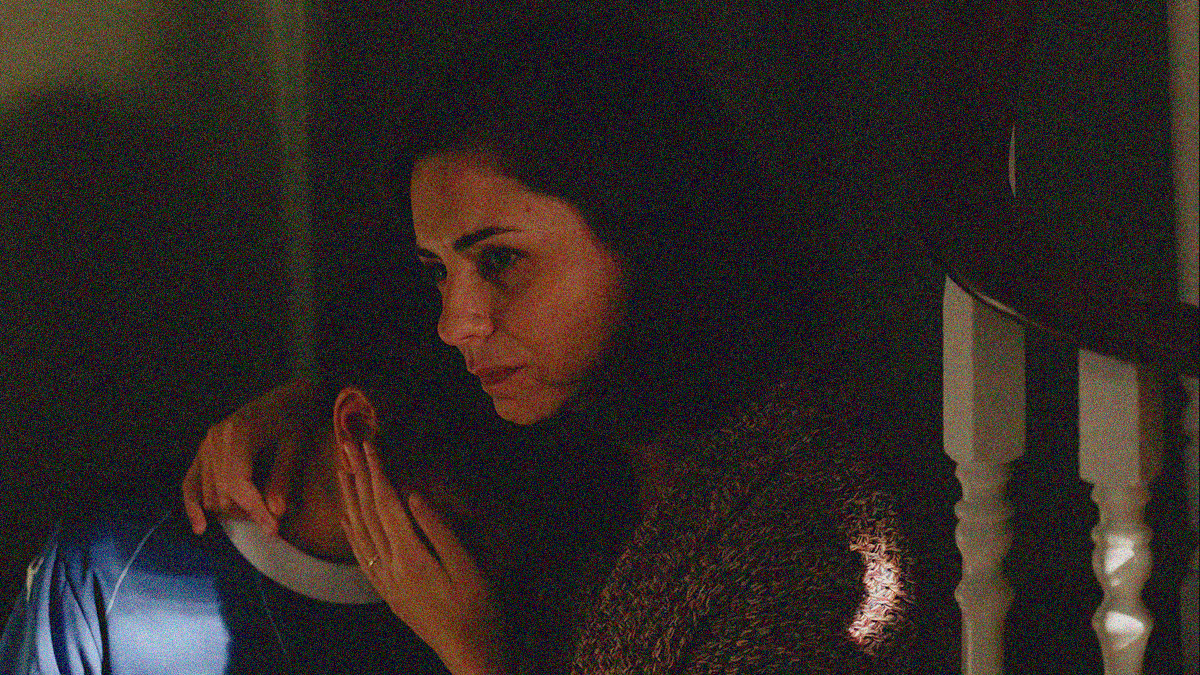
Nacer's (Samir Guesmi) mid-life crisis leads him where many do: a car dealership. He's had his eye on a Lexus RX for a long time and the salesman sees him caressing its curves on the showroom floor before beeping it open so he can check out the interior. The problem, however, is that Nacer cannot afford to fill the void of shame and anger he feels towards turning fifty with nothing to show for it this way. Sure, he has a beautiful, loving wife and three great kids. Yes, he has a devoted Muslim community who band together to run a summer camp. "Nothing" is having everything he needs, but not enough of what he wants.
I believe director Mathieu Denis and co-writer Alexandre Auger intentionally shroud some truths so that we assume Nacer is a stockbroker. The computer screens at his work all have spreadsheets, he idolizes "Oracle of Canada" Ben Novak (Vlasta Vrana) for his shrewd deals, and he dodges the calls of a friend who gave him $100,000 to invest. It's not until said friend gets cold feet and asks for the cash back that we realize Nacer is an amateur. He's read Novak's books, got inspired by the lore of working hard to succeed from nothing, and thought he could earn his own windfall. His actual broker explains that this hope was a pipe dream.
Inspired by a real 2012 Montreal case, The Cost of Heaven quickly makes good on an early conversation wherein a different friend asks Nacer how he's doing. The man asks the question again after the answer received carries anecdotes about everyone else's wellbeing instead. His wife Farrah (Meriem Medjkane) is great. The kids are great. Work is great. "But what about you?" What can Nacer say? That he's miserable? That this life so many would give anything to have isn't enough? That his ambition might ruining him? The thing about pride is that you can't admit your failings out loud. So, you exacerbate them in silence instead.
It's a one step forward, two steps back scenario wherein fate implores him to cut his losses and cash out. Rachid (Tahar Hadadine) doesn't blame him for the bad investment, he just wants what he can get back. Thibaud (Adrien Bletton) feels like a cutthroat Wall Street monster willing to bury anyone for profit but looks are so deceiving that he actually warns Nacer not to do what he's about to do to "fix" everything. One mistake compounds into five. The answer to the first arrives three mistakes too late. So, where else is there to turn besides Ben Novak himself? And if his advice is to fight back ruthlessly, how will Nacer comply?
There's a lot fueling Nacer's resentment, so the directions to choose from once Sara Mishara's camera finishes its 180-degree spin are many. Seeds of racism preventing upward mobility at work could conjure a lawsuit if he finds a lawyer willing to take the case. What about an injury settlement from staging an accident? Taking out a second mortgage? Could he find some way to leverage his debt via a hot stock tip to win everything back overnight? The only option he refuses to consider is asking for help. Nacer has bought into the "bootstrap" narrative so deeply that there's truly nowhere to go but down.
There won't be any angels coming down for the It's a Wonderful Life treatment either. No, the real world carries consequences and it doesn't matter how nice you are, how many people love you, or how hard you work—a working class person's choices are instantly set in stone. That's what too few comprehend and why so many poor Americans are indoctrinated into Trump's MAGA cult. To buy into the promise of a true meritocracy is to ignore that the game is rigged. Those in control got that power from privilege. Wealth. Name. Race. Gender. To watch Trump's government is to prove its idea of "merit" is merely white supremacy.
I honestly didn't consider how Nacer fights back because I forgot how lethal desperation can be. Part of it was Guesmi plays the character with so much heart (even his tall tales carried a warm smile). Part of it was because this specific plan was akin to suicide since he's neither ruthless enough to cover his tracks nor unmemorable enough to be forgotten. The beauty of The Cost of Heaven is therefore how hindsight often reveals that one's demise can seem to be wrought with intent. As though their subconscious is tired and knows they must be stopped before hurting anyone more than they already have.
So, there's a morality tale amongst the social issues that spanning ageism, racial bias, systemic wage theft, and an economic class disparity reinforcing itself by ensuring only those already at the table can afford to be at the table. Should Nacer be able to dream? Of course. But even that act can deceive. We're fed the "bootstrap" ethos to prevent us from fighting when it might actually matter. Nacer put his head down because the Ben Novaks of the world said work ethic is rewarded. That's a lie. Work ethic is exploited. If you realize that too late, self-destruction almost becomes inevitable.
7/10
Good Fortune
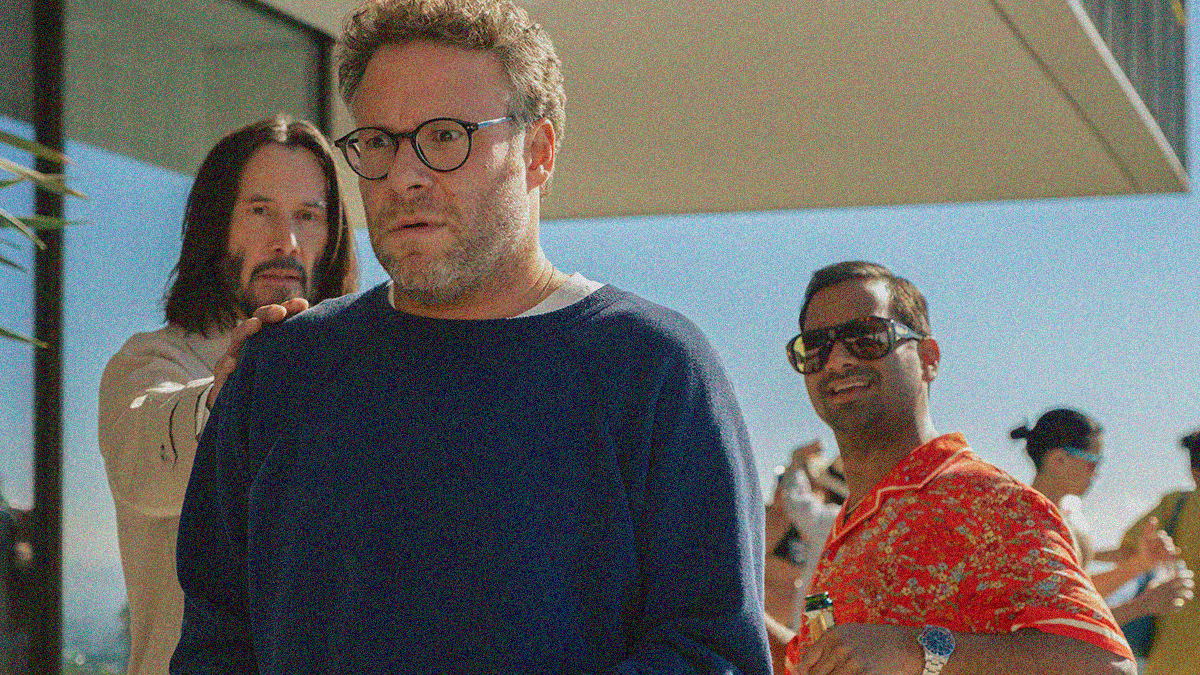
"It’s a well-made directorial debut that shows a love for cinematic history and a unique sensibility to build upon it rather than simply homage. Communal entertainment with lighthearted surrealist fantasy and relatable everyman problems."
Full thoughts at The Film Stage.
Karmadonna
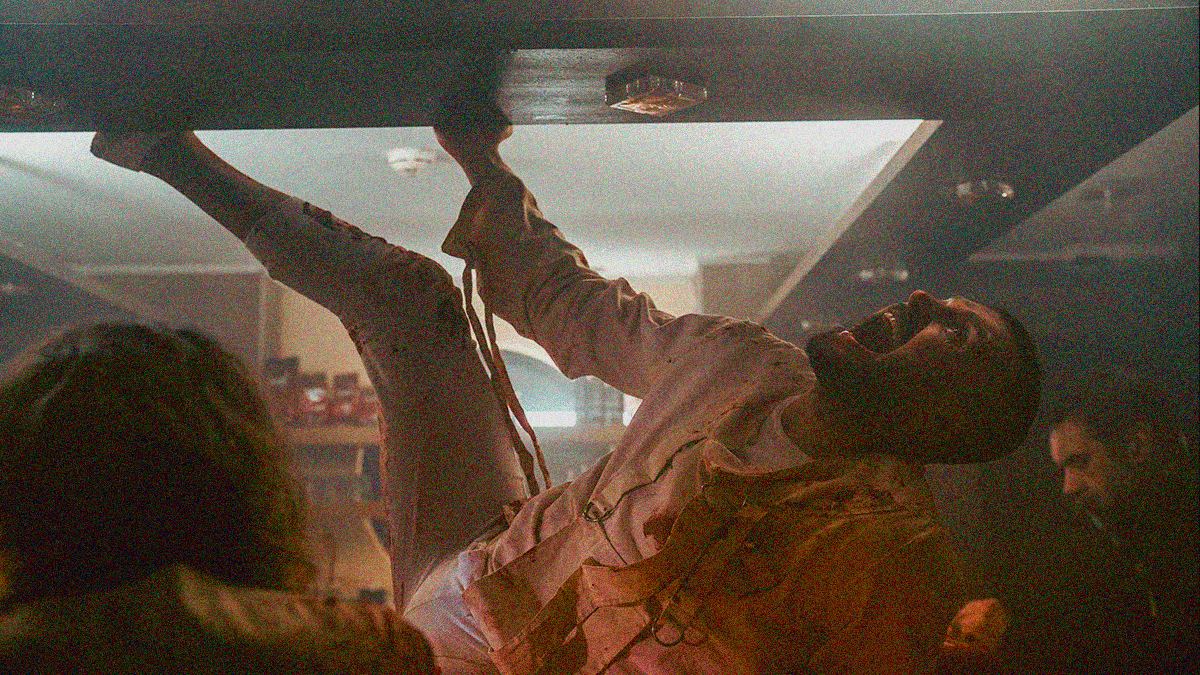
You'd be wrong to go into Aleksandar Radivojevic's directorial debut without trepidation since selling it as "from the co-writer of A Serbian Film" shows a willingness to alienate those who remember what that experience was like. Many will want nothing to do with anything remotely connected to it creatively as a result. And the world of Karmadonna commencing on a playground won't stop audiences from bracing for impact. It's why Radivojevic injects humor instead of depravity to ease us into the horror. After all, there's still two hours to go.
This scene opens with two young boys engaging in a violent altercation before a third breaks them up. Rather than stop and go their separate ways, however, these fighters join forces and turn on this Good Samaritan with more vitriol than they had for each other. It's a perfectly sardonic look at the plight of human rage and entitlement. That the desire to release our aggression is so strong, we don't care about the target's identity. It was never about them anyway. And since most of us wouldn't actually act on such impulses, we enjoy watching others do so on-screen.
Because it's funny to see that shift in target and the realization in the third boy that he's made a terrible mistake. It's funnier still to watch as their parents recognize what's happening before running over to end the carnage. So, we wonder what Jelena (Jelena Djokic) might make of the situation as an expectant mother in her forties. Will she start to question her decision to have a child if that's in her future? Does she have a bit of that violent intent within her too? Well, we're about to discover the answer as she picks up her phone.
The voice on the other end of the call introduces himself as Gautama (Sergej Trifunovic). And when that doesn't seem to elicit the desired response, he explains most people know him as Siddhartha. We scoff right alongside Yelena: "The Buddha?" He waxes on about being "the creator of content" and how he's grown disillusioned by how humanity has squandered his gifts. If it weren't for "them" (yes, even Gods must answer to superiors—seemingly the abstract concepts of capitalism and control), he'd have already erased our existence.
So, he's chosen to course correct instead and needs a corporeal accomplice to do it. He sees one in Yelena because he recognizes her love for her unborn baby. By blackmailing her with the threat of killing it with a whisper (something he proves possible by invisibly coaxing one of those boys to run head-first into a tree at full speed), she will become his divine assassin. Because the monstrous culprits he seeks to eradicate are protected by an impenetrable spiritual armor. He can't therefore infiltrate their minds, but Yelena can still shoot them in the head.
Karmadonna is this unorthodox pair's push towards that climactic battle between pissed off good and hubristic evil. The voice on the phone must simply put Yelena through some homicide trials to ensure she can be relied upon in the moment first. He'll inflict unbearable pain upon her body to guarantee she stays in line. He'll sic her on unsuspecting corrupted souls to test her threshold for violence. And he'll make her fend for herself when the actions necessary to achieve his goals spiral to the point where she also becomes hunted.
There's a goofiness to the whole as Radivojević ostensibly puts his warped vision of Neil Gaiman's American Gods through the filter of Mark Neveldine and Brian Taylor's Crank. It's about influencers proselytizing miracles orchestrated on the altar of reality television by sinful hedonist clergymen pulling our Messiah's strings. Buddha gave the world his son Bane (Milos Lolic) as its savior, but he's been hijacked by Kronjac (Milos Timotijevic) and Danica (Milica Stefanovic) to become a money-making machine. The karma scale has become untenable.
Yelena is stuck in the middle and in need of philosophical and "medicinal" assistance to wrap her head around the insanity. Bane's TV show got her to quit smoking and drinking before her pregnancy because she knew the person she became while abusing both wasn't fit for motherhood. But that person is exactly what Buddha needs to tear down Kronjac's defenses. So, he puts her into situations where those vices become unavoidable. Soon she's imbibing every bottle she can get her hands on to silence her conscience and rain down fire.
I will admit that I'm only half certain of what's going on mythologically. Buddha, samara, duḥkha, etc. Radivojevic goes into it all with expository context, but I'm not sure it really matters because it's a means to an end insofar as stripping Yelena of her morality and getting us to the wild sanitarium battle that awaits with muscle-clad psychopaths and firecracker pyros. It's the backdrop to deliver comical gags (just wait until you learn who Bane's brother was) and graphic gore (including a divine organ smoothie).
It's therefore a totally different beast than A Serbian Film. While still dark and gruesome with taboo topics such as pedophilia and infanticide, it never takes itself seriously. The stuff that Srdjan Spasojevic used to chill us is now wielded as midnight madness fodder to get crowds hooting and hollering rather than calling their therapists for an emergency appointment. It's fun rather than scarring. While that means Karmadonna is much more palatable and primed for repeat viewings, it does render it less significant. It's a trade-off most should embrace.
6/10
Normal
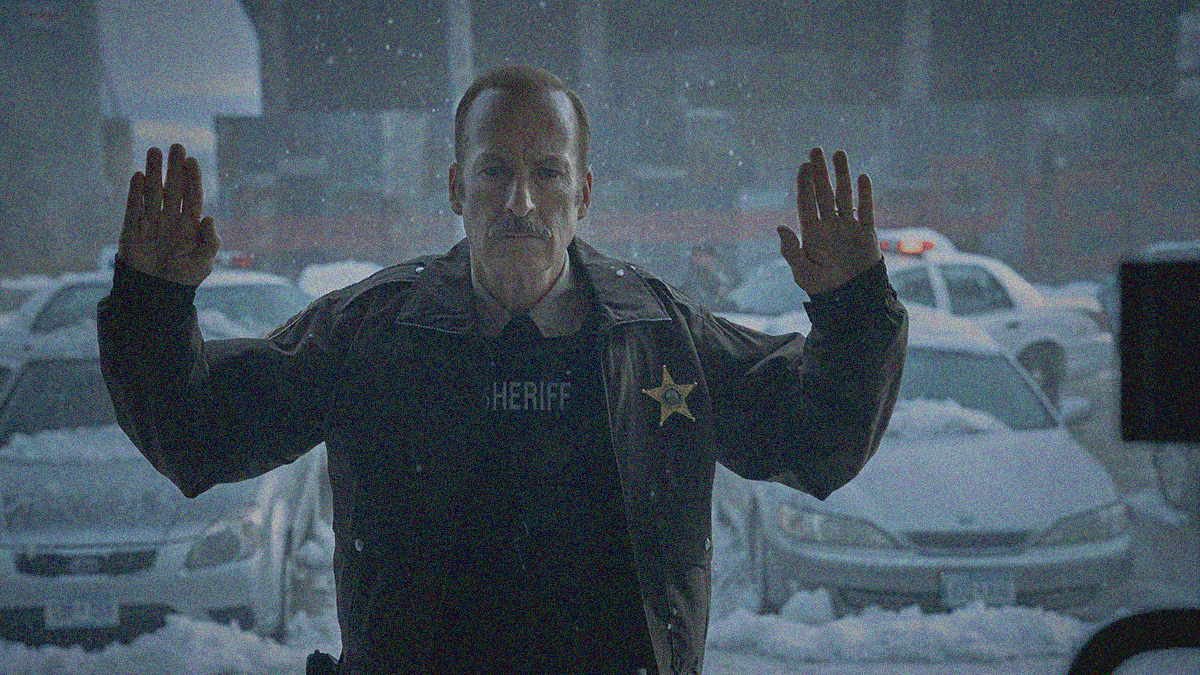
"While Normal doesn’t deliver anything you haven’t seen before rife with convenience, it’s still a memorable ride for those who have already been lapping up Kolstad’s antics."
Full thoughts at The Film Stage.

Pulled from the archives at cinematicfbombs.com.
Nick and Norah's Infinite Playlist screened on September 6, 2008 at TIFF.


